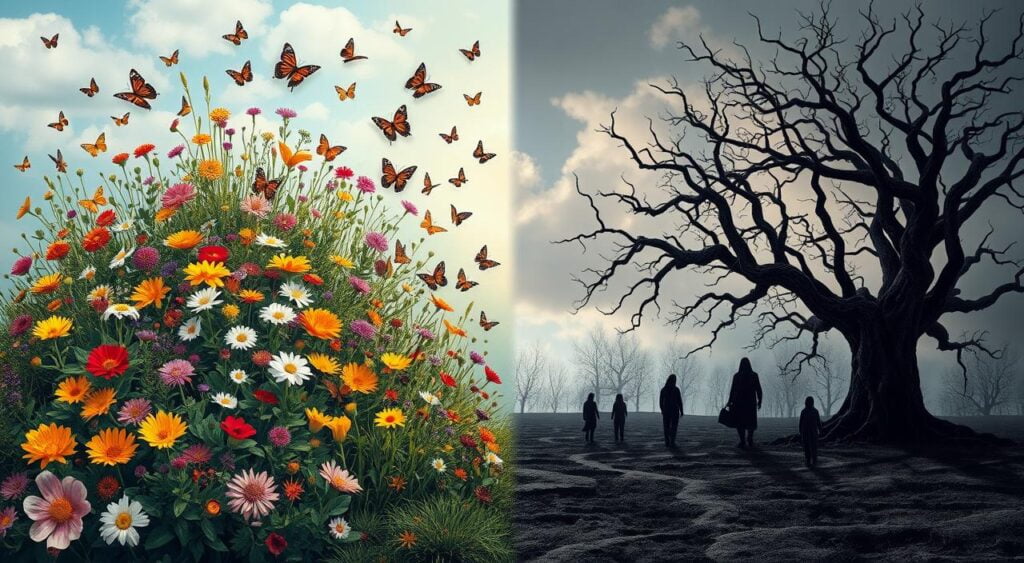In a world where real connections seem hard to find, we wonder if narcissists can have true friends. Narcissists are often seen as self-focused people who manipulate to get attention and1. This makes it seem unlikely for them to have lasting, meaningful friendships. But, the complexity of human relationships suggests there might be more to discover. So, Do Narcissists have friends?
Looking into the complex world of narcissists and their friendships, we learn a lot. We see the hurdles they face in making real friends. Knowing the traits and behaviors of narcissistic personality disorder helps us understand why they struggle to connect deeply with others.
- Narcissists often find it hard to make lasting, true friendships because they are self-centered and lack empathy1.
- At first, narcissists may seem charming and friendly. But, their friendships are usually shallow and all about what they get from others1.
- Empaths, who deeply understand and feel others’ emotions, can get drained in friendships with narcissists. This is because they always give without getting anything back1.
- Narcissistic friends often take over the relationship. Empaths then seek approval and validation from them1.
- Narcissists might see empaths’ deep feelings as a threat. They might control or belittle them to keep their power1.
By looking into the complex world of narcissists’ friendships, we learn a lot. We understand the challenges they face in making real connections. We also see how these relationships can affect those who get pulled into them. This knowledge helps us deal with these relationships better.
Understanding Trauma Bonds with Narcissists
Trauma bonds are complex and can form in relationships with narcissists. They are unhealthy attachments marked by power imbalance, intermittent abuse, and danger. These feelings are mixed with love and affection2. Narcissists use manipulation, isolation, and emotional ups and downs to keep victims in the relationship.Do narcissists have friends?
What is a Trauma Bond?
A trauma bond is an emotional tie between an abused person and their abuser, as Dutton and Painter found2. It’s formed by positive and negative experiences, leading to confusion and dependence. This bond is hard to break, even after the relationship ends2.
Signs and Symptoms of Trauma Bonding
It’s important to know the signs of trauma bonding. Victims may feel they owe the abuser, want to protect them, and ignore the relationship’s negatives3. They might also lose support from friends and family, feeling isolated and losing their identity3.
Why Narcissists Foster Trauma Bonds
Narcissists seek control and attention. They use tactics like love bombing and devaluation to form trauma bonds4. This cycle of abuse is hard to escape, mirroring behavioral psychology2. Knowing about trauma bonding helps us see and fight the abuse, even when others think love can change the abuser2.
Trauma bonds aren’t just in romantic relationships. They can happen in work, family, or friendships3. The power imbalance and intermittent reinforcement are the same in all these situations2. Healing from trauma bonds needs understanding of the psychological mechanisms and the courage to face the abuse, even when it seems impossible.
| Characteristic | Description |
|---|---|
| Power Imbalance | The relationship is characterized by an imbalance of power, with the narcissist exerting control and dominance over the victim2. |
| Intermittent Abuse | The narcissist engages in a cycle of abuse, followed by periods of love and affection, creating a sense of confusion and dependence2. |
| Emotional Attachment | Despite the abuse, the victim develops a strong emotional attachment to the narcissist, often feeling unable to leave the relationship2. |
| Lasting Impact | The trauma bond can persist even after the relationship has ended, with the victim continuing to feel the effects of the abuse2. |
Understanding trauma bonding helps us see and tackle the challenges in relationships with narcissists. This knowledge empowers victims to escape the abuse cycle and start healing.
The Eight Types of Narcissists
Understanding narcissism can be tough, with many types of narcissists. Dr. Ramani Durvasula’s research shows there are eight distinct types of narcissists5.
Grandiose Narcissists
Grandiose narcissists are the classic type. They think they’re superior and need constant admiration. They show arrogance, entitlement, and no empathy5.
Covert/Vulnerable Narcissists
Covert or vulnerable narcissists are different. They’re sensitive and may act out in passive-aggressive ways. They’re envious and insecure, always seeking validation5.
Malignant Narcissists
Malignant narcissists are the most harmful. They can be psychopathic, Machiavellian, and sadistic. They cause a lot of harm to those around them5.
Knowing about the different types of narcissists helps us deal with them better. By understanding their behaviors, we can protect ourselves and heal. Learning about narcissism’s origins can also help us understand it better6.
“Narcissism exists on a spectrum with various types having different levels of concern, necessitating the establishment of strong boundaries when dealing with individuals suspected of having narcissistic personality disorder.”
As we learn more about narcissism, recognizing and dealing with different types is key. It helps us protect ourselves and our loved ones from their harm5.
Do narcissists have friends
Narcissists do have friends, as they crave admiration and attention. Anecdotal evidence shows they can harm many areas of life, like family, work, and social circles7. They seem charming and friendly, drawing people into their circle8.
Narcissists’ Need for Friends and Admiration
Narcissists think too highly of themselves and need constant praise from friends8. They are image-conscious and needy, often struggling to match their thoughts and feelings7. Keeping friends is key for them, as it satisfies their endless need for attention7.
The Cycle of Narcissistic Friendships
But these friendships are shallow and one-sided, with narcissists using friends for their own benefit7. They start by being overly attentive, then discard or manipulate when it suits them7. Their traits, like disloyalty and possessiveness, make true connections hard7.
So, while narcissists may have many acquaintances, their relationships lack real depth and emotional connection7. Knowing how narcissistic friendships work can help people protect their mental health8.

Identifying Narcissistic Friendship Patterns
Understanding narcissistic friendships is key. These friendships start with charm and friendliness. But soon, the true controlling nature is revealed9. They use emotional tricks like gaslighting and love-bombing to keep control10.
Friendliness as a Lure
Narcissists seem warm and friendly at first9. They appear attentive and eager to connect. But this is just a trap to pull people in10. Once in, the friendship turns toxic and draining.
Emotional Manipulation and Control
Narcissists don’t care about others’ feelings, leading to one-sided friendships9. They use guilt and disregard boundaries to control10. This is all about their need for power.
Spotting these patterns helps us protect ourselves. Knowing these dynamics lets us choose better friendships. It’s about keeping our well-being in mind.

“Narcissists have an obsession with status, valuing material possessions, titles, and connections that enhance perceived status, leading to superficial relationships.”9
It’s vital to spot and deal with narcissistic friendships. Being aware and setting boundaries helps us stay emotionally safe. This way, we can focus on building real, supportive relationships.
Strategies for Dealing with Narcissistic Friendships
Dealing with a narcissistic friend is tough. But, we can protect ourselves and break free. Setting firm boundaries, staying emotionally detached, and cutting off contact can help us take back control11.
Self-care is key when facing narcissistic friendships. Doing things like deep breathing, yoga, or meditation can keep us calm11. Also, talking to trusted friends or a therapist can help us heal11.
- Know the signs of narcissistic personality disorder (NPD). Only a mental health expert can officially say you have it11.
- Make clear, consistent rules with the narcissist. Be ready to stick to them11.
- Stay emotionally detached. Don’t let the narcissist pull you into their games or try to control you12.
- Think if the friendship is good for you. If it’s not, it might be time to end it11.
Handling narcissistic friendships needs self-awareness, strength, and caring for ourselves. By using these methods, we can handle these tough situations and take back our power.13

“Narcissists may be sincere in their promises, but they also use promises for self-serving purposes. It’s essential to set clear boundaries and be prepared to enforce them.”11
Conclusion
Our look into whether narcissists can have true friends shows the complex and often harmful side of their relationships. Their lack of empathy and need for constant praise make forming real connections hard14. They use intimidation and charm to keep friends close, making it hard for people to leave14.
But, research shows narcissists know they start strong but then fade. They work hard to keep thinking well of themselves15. They believe they are seen positively and use tricks to get praise, keeping their self-image high15.
Knowing about different narcissists and how to handle their friendships helps us stay safe. It lets us move away from toxic relationships and find better ones14. Getting help from a counselor is key to healing from a narcissistic friendship and dealing with feelings of sadness14.
As we go forward, being careful about new friendships is important. Narcissists can turn people into victims, leading to more abuse14.
FAQ
Can narcissists have true friends?
Narcissists find it hard to make real friends because they are very self-focused. They don’t really care about others and always want praise. Their friendships are often shallow and only benefit them.
What is a trauma bond?
A trauma bond forms between an abused person and their abuser, like a narcissist. It’s marked by danger, positive reinforcement, and a feeling of being trapped.
What are the different types of narcissists?
Dr. Ramani Durvasula found eight types of narcissists. These include grandiose, covert/vulnerable, and malignant narcissists. Each type has its own traits.
Do narcissists have friends?
Yes, narcissists do have friends. They crave admiration and attention. But, their friendships are shallow and they use their friends for their own benefit.
How can you identify patterns of narcissistic friendships?
Narcissists seem friendly at first but show their true colors later. They use emotional tricks like gaslighting and love-bombing to control their friends.
How can you deal with a narcissistic friend?
Dealing with a narcissistic friend is tough. But, setting boundaries, staying emotionally detached, and cutting ties can help. It’s a way to take back control and find yourself again.
Source Links
- When Empaths and Narcissists Collide: The Fire and Ice of Toxic Friendships – https://vocal.media/journal/when-empaths-and-narcissists-collide-the-fire-and-ice-of-toxic-friendships
- Why Does Loving You Hurt? Understanding Trauma Bonds with a Narcissist – https://www.family-institute.org/behavioral-health-resources/why-does-loving-you-hurt-understanding-trauma-bonds-narcissist
- Trauma Bonding: What Is It and Why Do We Do It? – https://amfmtreatment.com/trauma-bonding-what-is-it-and-why-do-we-do-it/
- This is what you tell people who don’t believe you were abused by a narcissist – https://sylvialongmire.medium.com/a-guide-to-help-skeptical-friends-and-family-of-narcissistic-abuse-victims-understand-and-believe-9b4d14ac77f5
- There Are At Least 8 Types Of Narcissists — Which Ones Are Dangerous? – https://www.mindbodygreen.com/articles/types-of-narcissists
- The 5 types of people narcissists are attracted to, according to relationship experts – https://www.businessinsider.com/the-types-of-people-narcissists-are-attracted-to-2018-8
- Why Narcissists Do Not Have Real Friendships – Surviving Narcissism – https://survivingnarcissism.tv/why-narcissists-do-not-have-real-friendships/
- Signs of narcissistic friends – https://www.mentalhealth.com/library/signs-of-narcissistic-friends
- How Do Traits of Narcissism Affect Friendships? – https://psychcentral.com/disorders/indicators-of-a-narcissistic-friend
- Love Bombing and Narcissistic Abuse in Friendships – https://www.alisonmurpheylmft.com/blog/friendship-love-bombing
- How to Deal with a Narcissist: 10 Tools and Strategies to Help – https://www.healthline.com/health/how-to-deal-with-a-narcissist
- How to Deal with a Narcissistic Friend: Expert Tools & Tips – https://www.wikihow.com/Deal-with-a-Narcissistic-Friend
- The Case for *Not* Cutting Your Narcissistic Best Friend Out of Your Life – https://www.wellandgood.com/being-friends-with-a-narcissist/
- The End of the Narcissistic Friendship – https://graceformyheart.wordpress.com/2013/06/14/the-end-of-the-narcissistic-friendship/
- You Probably Think this Paper’s About You: Narcissists’ Perceptions of their Personality and Reputation – https://www.ncbi.nlm.nih.gov/pmc/articles/PMC3119754/







